| Srl | Item |
| 1 |
ID:
124590
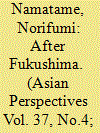

|
|
|
| 2 |
ID:
124591
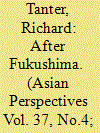

|
|
|
|
|
| Publication |
2013.
|
| Summary/Abstract |
Investigations of the Fukushima nuclear power accident sequence revealed the man-made character of the catastrophe and its roots in regulatory capture effected by a network of corruption, collusion, and nepotism. A review of corruption incidents in the global nuclear industry during 2012-2013 reveals that the Japanese experience is not isolated. Gross corruption is evident in nuclear technology exporting countries such as Russia, China, and the United States, and in a number of nuclear technology importing countries. The survey results make clear that national nuclear regulatory regimes are inadequate and that the global regime is virtually completely ineffective. Widespread corruption of the nuclear industry has profound social and political consequences resulting from the corrosion of public trust in companies, governments, and energy systems themselves.
|
|
|
|
|
|
|
|
|
|
|
|
|
|
|
|
| 3 |
ID:
124596
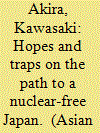

|
|
|
|
|
| Publication |
2013.
|
| Summary/Abstract |
The Fukushima nuclear disaster, which caused complex societal damage, also led to a shift in Japanese public opinion supporting the move away from nuclear power. The nuclear phaseout movement has transcended the traditional framework of Japanese social movements and has the potential to become a new force for reform. However, the Japanese nuclear phaseout is also complicated by the Liberal Democratic Party's style of rule, the link with nuclear weapons, and the relationship between Tokyo and the areas hosting the nuclear power plants. This article considers the future outlook for an energy shift and political reform in Japan with a focus on the roles of civil society and local leadership.
|
|
|
|
|
|
|
|
|
|
|
|
|
|
|
|
| 4 |
ID:
124594
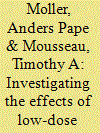

|
|
|
|
|
| Publication |
2013.
|
| Summary/Abstract |
The disasters at Chernobyl and Fukushima released large amounts of radioactive material, equivalent to many hundreds of nuclear bombs the size of those at Hiroshima and Nagasaki. Currently, there is worldwide interest in the effects of so-called low-dose radiation on public health and on biological systems from molecules to ecosystems. Research efforts to quantify these effects constitute a curious mixture of Soviet science, research by independent scientists, and research supported by the nuclear industry. The article explains how navigating between these diverse efforts can be reconciled to synthesize available information to the benefit of the general public and the policymaking community.
|
|
|
|
|
|
|
|
|
|
|
|
|
|
|
|
| 5 |
ID:
124595
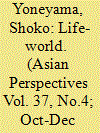

|
|
|
|
|
| Publication |
2013.
|
| Summary/Abstract |
The human and ecological disasters of Minamata and Fukushima highlight Japan's need to plan for a sustainable future. Ogata Masato, a Minamata fisherman, through his philosophy of "life-world" suggests that this quest for a sustainable future requires a change in the epistemology of social science. His philosophy offers a postmodern version of Japan's heritage of animism, where humans are connected with all living beings, including the souls of the living and the dead, as well as animate and inanimate entities in nature. His philosophy thus presents an alternative framework for a new modernity.
|
|
|
|
|
|
|
|
|
|
|
|
|
|
|
|
| 6 |
ID:
124592


|
|
|
|
|
| Publication |
2013.
|
| Summary/Abstract |
Large antinuclear demonstrations in 2012 and significant expansion of renewable energy have sparked a degree of euphoria about the prospects for phasing out nuclear energy in Japan. But Prime Minister Abe Shinzo is pronuclear and favors restarting Japan's idled reactors. His Liberal Democratic Party now controls both houses of the Diet and is a key pillar of Japan's nuclear village, comprising influential government, business, and political institutions that advocate nuclear energy. The nuclear village retains veto power over national energy policy, and citizens will not get to decide the outcome even if public opinion polls indicate that a vast majority favor phasing out nuclear energy. By ignoring many of the lessons of Fukushima and fast-tracking reactor restarts, the government and utilities continue to downplay risk, leaving Japan vulnerable to another nuclear accident.
|
|
|
|
|
|
|
|
|
|
|
|
|
|
|
|
| 7 |
ID:
124593
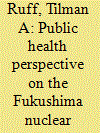

|
|
|
|
|
| Publication |
2013.
|
| Summary/Abstract |
The Fukushima nuclear disaster is far from over and remains a global health concern. While evacuations, sheltering, reducing intake of contaminated food, and other measures reduced radiation exposures, both the immediate and longer-term public health responses to the disaster leave major room for improvement. Commercially and institutionally, vested interests have undermined public health and safety.
|
|
|
|
|
|
|
|
|
|
|
|
|
|
|
|
| 8 |
ID:
124598


|
|
|
|
|
| Publication |
2013.
|
| Summary/Abstract |
In order to assist the victims of the Fukushima Daiichi nuclear disaster, we first need to understand people's lived experiences of the disaster in its social, cultural, and historical context. In this article I outline how phenomenological psychology, a qualitative research approach based upon in-depth interviewing, can be the source of such knowledge. Case vignettes highlight the unique psychological situation of seven individuals, with implications for helping victims of this disaster more generally.
|
|
|
|
|
|
|
|
|
|
|
|
|
|
|
|